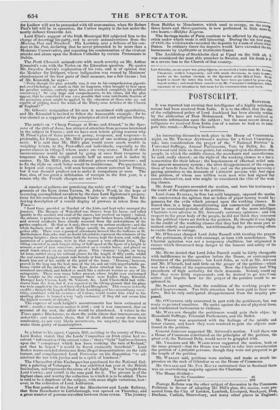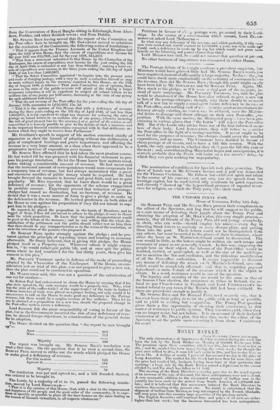An interesting discussion took place in the House of Commons
las night, on Mr. Tuosisis ATTwoon's motion for a Select Committee to take into consideration the prayer of the " National Petition" fa Universal Suffrage, Annual Parliaments, Vote by Ballot, Fee. Mt Avrwood said little mi these points, but enlarged upon thedistress of lit People, in which the middle classes, the merchants and manufacturers. he said, really shared ; on the right of the working classes to a fair re. muneration for their labour ; the hopelessness of effectual relief' under the present monetary system ; the utter disappointment of the expects. - tions of benefit from the Reform Act ; and on the pressing necessity of paying attention to the demands of 1,200,000 persons who had signed the petition, of whom one million were men who had signed their names themselves, and who might be considered the elite of the work. ing classes.
Mr. JOHN FIELDEN seconded the motion, and bore his testimony to the truth of the allegations iu the petition.
Lord Joust RussELL, in firm but mild language, opposed the motion. He controverted the opinion that an influx of paper-money would be a panacea for the evils which pressed upon the working classes. He feared that, in a large manufacturing and commercial country, there roust be occasional periods of distress. Some of the more intelligent • Chartists were adverse to Mr. Attwood's currency opinions ; and with respect to the great body of the people, he did not think they concurred in the political views set forth in the petition. He thought it was highly to the credit of the working classes that they had for the most part re• mined orderly and peaceable, notwithstanding the persevering efforts to excite them to outrage.
Mr. D'Isnaou charged Lord John Russell with treating the prayers of the petitioners, if not with contempt, at least with nonchalance. The Chartist agitation was not a temporary ebullition, but originated in causes which threatened deep danger to the honour and safety of the country.
Mr. HustE denied that Lord John Russell could be fairly chargeable with indifference to the question before the House, or contemptuous treatment of the petitioners : but Lord John, as well as Mr. Attwood and Mr. D'Israeli, had said little on the prayer of the petition—which was for a reform of the representation. Now the Chartists had Whig precedents of highs authority for their demands. Nobody could say that they were fairly represented ; and he desired to go into Come mittee and .inquire how for the prayer of the petition could be ac- quiesced in.
Mr. SLANEY agreed, that the cmidition of the working people re- quiredimprovement. Too little attention had been paid to their com- forts. But he only anticipated disappointment from the inquiry pro- posed.
Mr. O'Coxsr.r.n only concurred in part with the petitioners, but was ready to go into Committee. He spoke against the use of physical force, and condemned incitements to violence.
Mr. WALLACE thought else petitioners would gain their object by Household Suffrage, Triennial Parliaments, and the Ballot.
Mr. WHITE was acquainted with the feelings of the middle and lower classes, and knew they were resolved. to gain the objects men- tioned in the petition.
General JOHNSON supported Mr. Attwood's motion, Until there was a House of Commons constituted on the principles of the petition, the great evil, the National Debt, would never be grappled with.
Mr. VILLIERS and Mr. WARBURTON supported the motion, both on the same ground—that the House was bound to take into consideration the petition of 1,200,000 persons; though they were not prepared to go the length of the petition.
Mr. WAKLEY said, petitions were useless, and made as much im- pression on the rock of Gibraltar as on the House of Commons.
Mr. OSWALD and Mr. Fox Marso maintained that in Scotland there was an overwelming majority against the Chartists.
The House divided— For the Committee 46
Against it 235
Postage Reform was the other subject of discussion in the Commons. Petitions its favour of adopting Mr. Hill's plan, this session, were pre- sented from the City of London, Lambeth, Liverpool, Stockport, Deal, Durham, Carlisle, Shrewsbury, and many other places in England;
from the Convention of Royal Burghs sitting in Edinburgh, from Aber- deen, Peebles, and other Scottish towns; and from Dublin.
Mr. SPRING RICE having moved that the report of the Committee on the Post-office Acts be brought up, Mr. GOULBURN moved to substitute for the resolution of the Committee, the following series of resolutions- .' That it appears from the Finance Accounts of the United. Kii!g,dom laid upon the table of this House, that the excess ofexpenditure over income for
the year 1837 was 655,760/., and for the yea
House IF the CI 11 of the Exchequer, That from a statement submitted to this ouse y t lance or O. Le
Exchequer, the excess of expenditure over income for the year ending the 5th day of April 1840, is estimated at not less than 8130,0001. ; making a total ex- cess of expenditure over income, in the three years ending the 5th day of April 1840, of not less than 1,860,9871.
I' That the Select Conunittee appointed to inquire into the present rates and mode of charging postage, with a view to such a reduction thereof as may be made without injury to the revenue, reported to this House, on the 13th day of August 1838, as follows—' That your Committee arc of opinion, that, as soon as time state of the public revenue will admit of the risking a larger temporary reduction, it will be expedient to subject all inland letters to an uniform rate of one penny per half-ounce, increasing at the rate of one penny
for each additional half-ounce.' " That the net revenue of the Post-office for the year ending the 5th day of January 1839, amounted to 1,656,993/. 15s. 3d. " That it is the opinion of this House, that with a deficiency of revenue during the three years ending on the 5th day of April 1840, of not less than 1,860,9871., it is not expedient to adopt any measure for reducing the rates of postage on inland letters to an uniform rate of one penny, (thereby Meaning the risk of great present loss to the revenue,) at a period of the session so (a- vowed that it is scarcely possible to give to the details of such a measure, and to the important financial considerations connected with it, that deliberate at- tention which they ought to receive from Parliament."
Mr. Goulburn's speech in support of his motion consisted chiefly of arguments to show the hazard of adopting without due deliberation a plan of complicated bearings and grave importance, and affecting the revenue to a very large amount, at a time when there appeared to be a progressive increase of expenditure over income. Mr. Seam Ittcw affirmed that he had taken the most prudent course.
He had waited till lie was prepared with his financial statement to pro-
pose his postage resolution. He let the House know how matters stood, before risking a considerable amount of revenue. He had never said that the increased amount of correspondence would soon compensate for a temporary loss of revenue, but had always maintained that a great and enormous sacrifice of public money would be required. lie had brought forward the measure in honour and good faith, and not to gain popularity. Mr. Rice repeated, that he knew there would be a great deficiency of revenue ; but the opponents of the scheme exaggerated its probable amount. Experience proved that reduction of postage- charges had caused no diminution, but an increase, of revenue. lie denied that it was a mere matter of form to give a pledge to make up the deficiencies in the revenue. He invited gentlemen on both sides of the House to vote against his proposition if they did not intend to sup- port him in his pledges— He repeated, he placed the proposition in the hands of Members; and he begged of them, if they did not intend to adhere to the pledge, at Once to throw aside the whole preposition. He knew that the public disappointment would be great at the failure of the measure; and he was willing that the whole dis- satisfaction of the petitioners and the public should rather rest on him, than that there should be any misapprehension as to the terms of the resolution, or as to the intentions of the persons who proposed it.
Sir ROBERT PEEL spoke strongly against the pledge ; and he pro- tested against the principle of repealing taxes and trusting to economy afterwards. He firmly believed, that in giving this pledge, the House pledged itself to a Property-tax. Whatever odium it might expose him to, "he would rather quo public life, and at once quit the public
arena where he had combated for the last thirty years, than give his consent to this plan."
Mr. Potn.urr THOMSON spoke in defence of the mode of proceeding
adopted by the Chancellor of the Exchequer. If the House, on con- sideration and on trial of this plan, was not prepared to give a new tax, then the plan could not be continued in operation.
Mr. WARBURTON said, this was not a question of the substitution of One tax for another— Sir Robert Peel had endeavoured to alarm the House by arguing that if his plan were agreed to, the only resource would be a property-tax. Why, what was the state of the coffee-trade? of the sugar-trade? of the trade in timber? If those branches of trade were placed on a proper footing, not only would it be unnecessary to call on the House to make good any deficiency in the Postage revenue, but there would be a surplus revenue of five millions. Then let no one be alarmed at a proposition for a new tax, should the proposed change in the Post-office system create a deficiency.
Lord SANDON felt the great responsibilty of voting in favour of the plan, but as the Government incurred the risk of any deficiency of reve- nue, he should tbrego objections, in consideration of the general desire for its adoption.
The House divided on the question that " the report be now brought up"— 125 184 59
The resolution was put and agreed to; and a bill founded thereon was ordered to be brought in.
The Lords, by a majority of 41 to 34, passed the following resolu- tion, moved by Lord 13nouiniAm-
That it is the opinion of this House, that, with a view to the improvement and happiness of the people and the good order of the community, it is expe- dient as speedily as possible to place all the beer-houses on time same footing as the houses of licensed victuallers, in all respects whatsoever." Ayes 213 Noes 113 Majority 100
The report was brought up. Mr. SPRING Times resolution was read a first time. On the question that it be read a second time, Sir Ronimm PEEL moved to strike out the words which pledged the House to make good a deficiency of revenue.
For this motion Against it Majority
Petitions in favour of cheap postage were presented to their Lord- ships. In the course of a conversation which ensued, Lord ELLEN., BOROUGH asked Lord Melbourne— In what way any deficiency of the rev:ame, and which probably, if this mea- sure were carried out, would amount to 1,0.10,000/. a year, was to be made up.? Could such a deficiency be made up by any tax which would not press more heavily On the labouring and poorer classes than this? Lord Mehnortixe said, lie could not answer that question at present.
No other business of importance was transacted in either House.



























 Previous page
Previous page